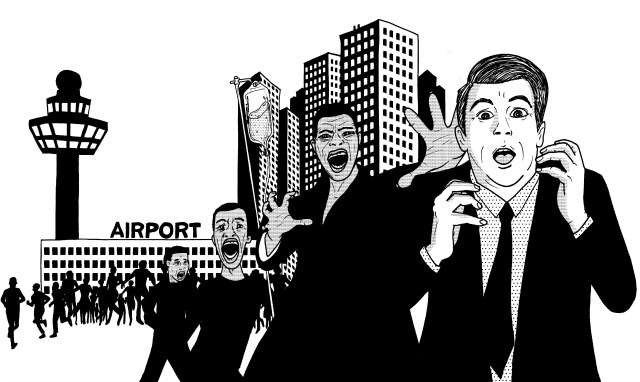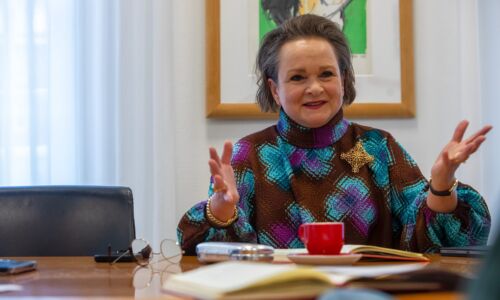Mass hysteria or valid fear? Researchers on the coronavirus
-
 Illustratie: Elmar Noteboom.
Illustratie: Elmar Noteboom.
The coronavirus dominates the headlines. But what is the virus’ actual or potential impact? Three Nijmegen researchers apply their expertise to shed light on the outbreak.

Andreas Voss, Professor of Infection Prevention
‘We absolutely have to take the coronavirus outbreak seriously. In theory, it could even lead to social disruption in the long run. Over the next two years, I expect 50% to 60% of people to become infected. More than four fifths of them will have mild symptoms, similar to a mild flu. The difference with ‘normal’ flu is that no one in the Netherlands has antibodies to the coronavirus.
But as long as the spread rate increases gradually, the healthcare system can cope with it and there’s no reason to panic. The infection spreads through contact with mucus membranes. Good eye, mouth and nose hygiene is therefore crucial, and also more effective than wearing a face mask. We often touch our hands to our eyes, mouth, and nose. We should become more aware of this and wash our hands on a regular basis. I also advise people to cough into their elbow and keep a 1 to 1.5 metre distance from other people. As much as possible, avoid small, crowded spaces with poor ventilation. These are ideal conditions for any virus to spread, including the coronavirus.
A measure the Netherlands will ultimately have to take is cancelling large-scale events that attract large crowds, like France and Germany are doing already. Radboud University can advise students and staff to stay at home if they feel unwell. The University can also loosen compulsory attendance requirements to make it easier for people to call in sick. Closing down universities is going a step too far at this point.’

Inge Mutsaers, Biologist and Philosopher, completed a PhD on the social and political response to the Mexican flu
‘In their class’ WhatsApp group, my daughter and her classmates encourage each other to wash their hands thoroughly. This morning I was supposed to meet someone, but they let me know they were feeling somewhat ill: Would I feel comfortable meeting them, in view of the coronavirus outbreak?
These are all signals that fear of the coronavirus is nestling into our society. This panic has a price tag – and not only in economic terms. People are scared, which is burdensome, while the mortality rate from the coronavirus is so far not much higher than that of a seasonal flu.
This fear is fed by endless media attention. Take the NOS, which devoted a special broadcast to the virus outbreak. Although this was intended to distinguish facts from fables, it did mean that the coronavirus was apparently serious enough to devote an entire television broadcast to it. This message is what people remember, and ultimately this kind of broadcast does more harm than good.
We live in a society with ever-growing medical and technological possibilities, allowing us to identify viruses and other threats much faster. As Philosopher Peter Sloterdijk argues, this has made us more risk-aware than ever and it’s increased demand for immunisation measures – we want to protect ourselves. But that’s not always possible. It’s not possible now: there is no vaccine against the coronavirus yet. In this way, innovations can actually weaken rather than strengthen our sense of safety.
It’s all about striking a balance between taking measures against the threat posed by the virus and keeping social fear in check. The National Institute for Public Health and the Environment (RIVM) are doing their utmost best to communicate in a neutral tone. But the excessive media attention disrupts the balance, tilting it towards scaremongering. I find a question like ‘Should we close down the schools?’ bizarre. Let’s do our best to keep things in perspective.’

Eelke de Jong, Professor of International Economics
‘Globalisation offers advantages, but it also makes economies more fragile. This is what the coronavirus outbreak shows. Closing down factories in China and Italy leads to companies shutting down in countries where there is hardly any coronavirus yet. Take the automobile industry: its production chain has become spread all over the world, with the consequence that it’s been hit very hard. But the coronavirus has also dealt a heavy blow to a company like Google, due to lost advertisement costs. Companies with limited stocks, like Coolblue, place fewer advertisements because they cannot guarantee delivery.
For the Netherlands, the biggest threat in the long term is medicine shortage. Western factories that produce medicine depend on raw materials from China and India. Thanks to hard negotiations, the Netherlands now pays the lowest price for medicines. If pharmaceutical companies are no longer able to deliver enough raw materials due to shortages, they will first deliver to the countries paying top price. The Netherlands will end up at the bottom of the list.
To be less dependent on far-off countries, and therefore less vulnerable within our global economy, companies could make different choices. European companies could for instance decide to open a factory in a place like Slovakia, rather than in China, despite higher costs. This process is already underway, triggered by Trump’s ‘America first’ policy, but the coronavirus might accelerate it substantially.’
Coronavirus on Campus
As far as the coronavirus is concerned, Radboud University follows the guidelines of the National Institute for Public Health and the Environment (RIVM) and the Municipal Health Centre (GGD). Additional measures, for instance for cleaning teams, are not required at present. Spokesperson Anja van Kessel cannot say whether this will change when the first case of coronavirus is diagnosed on campus. Nor is the University prepared for large-scale long-distance education. ‘We have no ready-made scenario for such cases, but we’re following developments closely. Long-distance learning might be an option, if necessary. But we’re not there yet.’
Housemates of patients infected with the coronavirus and people who recently visited areas where the virus was active and who suffer from cold-like symptoms or fever are urgently requested to stay home for fourteen days. The spokesperson does not know whether and if so how many students and staff members currently follow this advice. Students with symptoms of coronavirus are asked to contact their study advisor by telephone or email to discuss potential consequences for their studies. ‘We look at consequences for study delay on a case-by-case basis,’ says Van Kessel.
At the moment, there’s one Radboud University exchange student in Beijing (orange zone, non-essential travelling is advised against) and one in Hong Kong (yellow zone, attention: safety risks). Two students are in South Korea and fifteen in North Italy (yellow zones). ‘We’re in contact with them and they’re all well,’ says Van Kessel.



